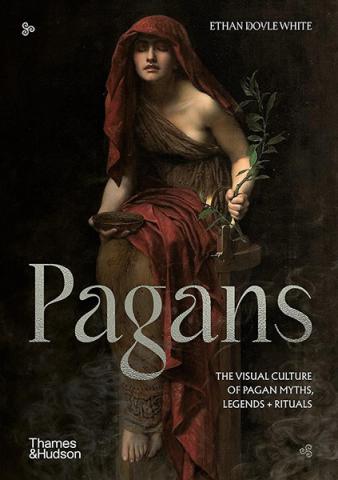Varan finns inte i lager, längre leveranstid.
| Finns i lager? | ||
|---|---|---|
| Webblager | Bevaka | |
| Stockholm | Hämta i butik | |
| Göteborg | Hämta i butik | |
| Malmö | Hämta i butik | |
| Linköping | Hämta i butik | |
A fascinating, clear, and detailed historical analysis of the eclectic and beautiful visual and material culture of paganism.
Focusing on a curated selection of pagan art and artifacts, this book explains the iconography and mystic power of pagan ritual objects from around the world. Ethan Doyle White identifies three critical elements of paganism from classical antiquity to today: polytheism, affiliation with nature, and witchcraft and divination. Fundamental symbols are identified and examined closely, and central myths and allegories are clarified to provide new insights into the philosophies and beliefs of pagans.
Pagans begins with an introduction that clarifies what we mean by “pagan.” It traces the pre-Christian origins of paganism, the development of the different aspects of pagan belief over centuries, and how materials from the pre-Christian religions of Europe, North Africa, and West Asia are built into the practices of today’s Pagans.
The book is organized into three broad sections:“Ancient Ways,” “Ritual,” and “Community”- each containing three themed chapters. For each chapter, illustrated text is interspersed with double-page presentations of the key figures, stories, and iconography relevant to each theme. Readers will not only come to understand the many symbols that define pagan religions and practices but will also discover the beliefsand philosophies of pagans from around the world, from polytheism to pantheism and from magic and ritual to ideas about the afterlife.
This is the second in a series of books on the material and visual culture of global religions and spiritual traditions, highlighting the iconography and mystic power of ritual objects and images.
450 color illustrations
Focusing on a curated selection of pagan art and artifacts, this book explains the iconography and mystic power of pagan ritual objects from around the world. Ethan Doyle White identifies three critical elements of paganism from classical antiquity to today: polytheism, affiliation with nature, and witchcraft and divination. Fundamental symbols are identified and examined closely, and central myths and allegories are clarified to provide new insights into the philosophies and beliefs of pagans.
Pagans begins with an introduction that clarifies what we mean by “pagan.” It traces the pre-Christian origins of paganism, the development of the different aspects of pagan belief over centuries, and how materials from the pre-Christian religions of Europe, North Africa, and West Asia are built into the practices of today’s Pagans.
The book is organized into three broad sections:“Ancient Ways,” “Ritual,” and “Community”- each containing three themed chapters. For each chapter, illustrated text is interspersed with double-page presentations of the key figures, stories, and iconography relevant to each theme. Readers will not only come to understand the many symbols that define pagan religions and practices but will also discover the beliefsand philosophies of pagans from around the world, from polytheism to pantheism and from magic and ritual to ideas about the afterlife.
This is the second in a series of books on the material and visual culture of global religions and spiritual traditions, highlighting the iconography and mystic power of ritual objects and images.
450 color illustrations



